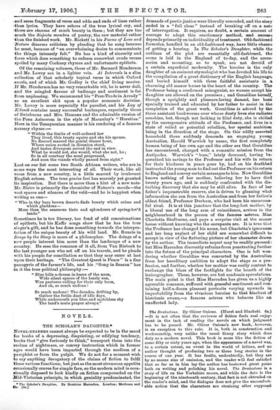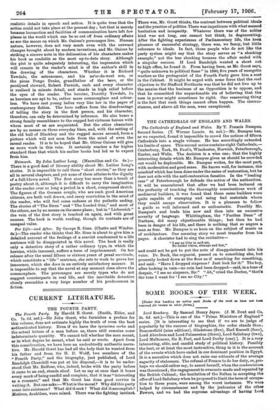The Drakestone. By Oliver Onions. (Hurst and Blaokett. Os.) —It
is not often that the reviewer of fiction finds real enjoy- ment in the task of reading the novels on which judgment has to be passed. Hr. Oliver Onions's new book,. -however, is an exception to this rule. It is, both in construction and workmanship, very unlike the usual flimsy story which does duty as a modern noveL This book is more like the fiction of some fifty or sixty years ago, when the appearance of a novel wee, to a certain extent, an event in the world of letters, and no author thought of producing two or three long stories in the course of one year. It has faults, undoubtedly, but they are by no means sins of omission, and the reader will feel satisfied that so far as in him lay the author has bestowed great pains both on writing and polishing his novel. The Dralcestone is a story of life on the Yorkshire moors, and while the date is the beginning of the nineteenth century, that fact is not obtruded On the reader's mind, and the dialogue does not give the uncomfort- able notion that the characters are straining after supposed
realistic details in speech and action. It is quite true that the action could not take place at the present day ; but that is merely because locomotion and facilities of communication have left few places in the world which can be so cut off from ordinary affairs as are the moors on which Mr. Onions's personages live. Human nature, however, does not vary much even with the outward changes brought about by modern inventions, and Mr. Onions by striking a sincere note in the delineation of his characters makes his book as readable as the most up-to-date story. Although the plot is quite adequately interesting, the impression which will remain in the reader's mind is of the author's skill in
the drawing of the characters. Whether it is Richard Yewdale, the astronomer, and his ne'er-do-weel son, or the pions Pongo Drake, grandfather of the hero, or the paralysed steward, Robert Famish, each and every character is realised in minute detail, and stands in high relief before the eyes of the reader. The heroine, Dorothy Yewdale,
as heroines are apt to be, rather more commonplace and colour- less. We have met young ladies very like her in the pages of contemporary fiction. The hero suffers from the disadvantage of telling the story in the first person, and his character, therefore, can only be determined by inference. He also bears a strong family resemblance to the rugged but virtuous heroes with whom most of us are acquainted. But the other characters are by no means on these everyday lines, and, with the setting of the old hall of Blackboy and the rugged moors around, form a picture which will not soon fade from the mind of even the casual reader. It is to be hoped that Mr. Oliver Onions will give us more work in this vein. It certainly reaches a far higher standard than that which his earlier books had led us to expect from him.











































 Previous page
Previous page